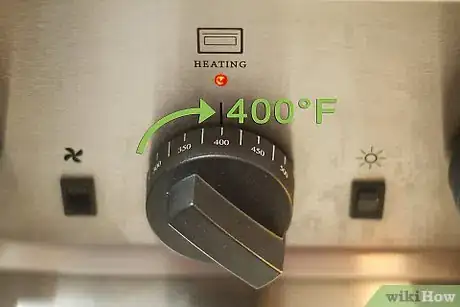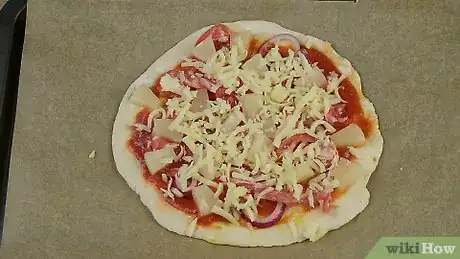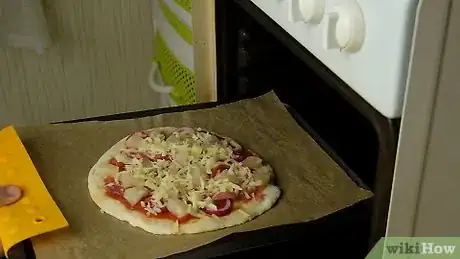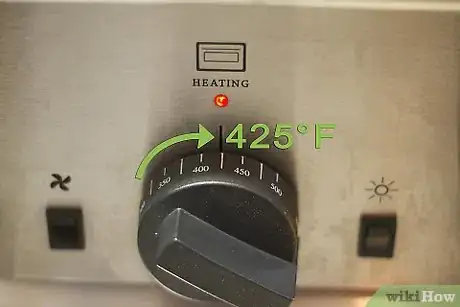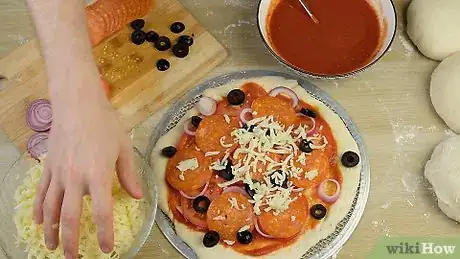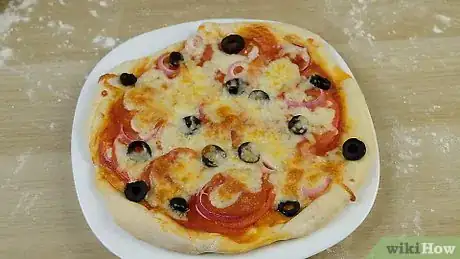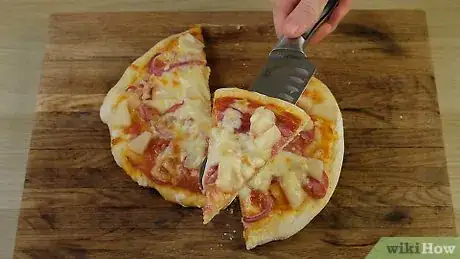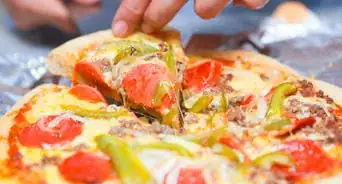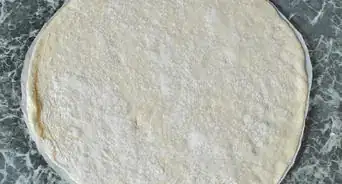This article was co-authored by Ollie George Cigliano. Ollie George Cigliano is a Private Chef, Food Educator, and Owner of Ollie George Cooks, based in Long Beach, California. With over 20 years of experience, she specializes in utilizing fresh, fun ingredients and mixing traditional and innovative cooking techniques. Ollie George holds a BA in Comparative Literature from The University of California, Berkeley, and a Nutrition and Healthy Living Certificate from eCornell University.
There are 11 references cited in this article, which can be found at the bottom of the page.
wikiHow marks an article as reader-approved once it receives enough positive feedback. This article received 20 testimonials and 100% of readers who voted found it helpful, earning it our reader-approved status.
This article has been viewed 1,954,647 times.
If you like ordering pizza from your local pizzeria, you'll love making it at home. And if you like it and don’t know how to cook, this is how to go. Pizza is tasty food, and you can cook it. This article gives instructions on how to make hot, fresh pizza the fast way, or from scratch. Scroll to the bottom for a section on popular toppings combinations.
Ingredients
- 1 pizza base
- Yeast
- Pizza sauce
- Favourite pizza toppings
- Grated mozzarella cheese
- 1 1⁄2 cups (350 ml) of warm water
- 1 package or 2 1⁄4 teaspoons (11 ml) of active dry yeast
- 3 1⁄2–4 cups (830–950 ml) of flour (bread or all-purpose)
- 2 tablespoons (30 ml) of olive oil
- 3 cups (710 ml) of homemade pizza sauce
- Favorite pizza toppings
- 4 cups (950 ml) of grated mozzarella cheese
- Cornmeal
- 2 teaspoons (9.9 ml) of salt
- Grated cheese (mozzarella, romano, parmesan, goat cheese or some combination)
- Sliced pepperoni
- Chopped onions
- Green peppers
- Sausage
- Bacon or bacon bits
- Chicken chunks
- Olives (Black, green, or stuffed)
- Mushrooms
- Ground beef
- Ham pieces
- Pineapple slices
- Basil
- Roasted garlic
- Barbecue chicken
Steps
Fast Pizza
-
1Preheat the oven to 500 °F (260 °C). The oven should be piping hot before you start cooking the pizza or else the crust will be limp and soggy and the topping will be overcooked[1]
-
2Prepare the crust. Remove the unbaked crust from the packaging. Place it on a round or rectangular baking sheet, depending on what you have on hand. Use a pastry brush to spread a thin coating of olive oil over the top of the crust.Advertisement
-
3Spread pizza sauce on the crust. How much pizza sauce you add is purely a matter of personal preference. If you love a lot of sauce, go ahead and slather it on. If you prefer your pizza on the dry side, spoon a little in the middle and spread it around in a thin layer.
- If you want to make a white pizza, add a little extra olive oil and skip the pizza sauce.[2]
- You can make a quick pizza sauce using tomato paste, a can of diced tomatoes, and some spices. Simmer the paste and tomatoes (without draining them first) together over low heat. Add salt, oregano and pepper to taste. Continue simmering until the sauce cooks down to the consistency of pizza sauce.
-
4Add toppings. Layer your favorite toppings over the sauce. Add as many or as few toppings as you want. Put the heavier toppings, like onions, chicken or sausage, on the bottom layer, and add lighter toppings, like spinach leaves or peppers, on the top layer. Continue until your pizza is loaded with the amount of toppings you like.[3]
- Other than pepperoni and ham which are pre-cooked, meat toppings should always be cooked before you put them on the pizza. They'll get heated when you bake the pizza, but they won't fully cook. If you're using ground beef, sausage, chicken, or another meat, cook it thoroughly in a pan on the stove or in the oven and drain the grease before you add it to your pizza.
- Remember that if you add too many vegetable toppings, your pizza crust may turn out a little soggy. The water from the vegetables moistens the dough. Limit the amount of spinach and other "watery" vegetables you put on your pizza if you're worried about this happening. Plus, precooking the watery vegetables will remove the bitterness and add the crunch[4]
-
5Add the cheese. Sprinkle mozzarella cheese over the toppings. Layer it on thick if you like it that way, or add a thin layer if you're going for a lighter pizza. Use Cheddar if you like, science has confirmed that mixing both will results in a browner, more elastic cheese[5]
-
6Bake the pizza. Place the pizza in the oven and have it bake for about 20 minutes, or until the crust is golden brown and the cheese is melted. Remove it from the oven and allow it to cool for a few minutes before slicing.
Pizza from Scratch
-
1Proof the yeast. Place the warm water in a large mixing bowl. Pour the yeast onto the water and let it sit until it dissolves. After a few minutes the yeast mixture should begin to bubble.[6]
-
2Add the other dough ingredients. Put the flour, olive oil, and salt in the mixing bowl with the yeast mixture. Use the dough hook attachment on your stand mixture or work by hand to stir the ingredients together until a wet dough forms. Keep mixing the dough until it becomes smooth and elastic.[7]
- If you're working by hand, the dough will become difficult to stir when it starts to thicken. Put down the spoon and knead the dough until it reaches the right texture.
- If the dough looks wet after you've been mixing or kneading it for a long time, add some flour to dry it it up a little.
-
3Let the dough rise. Form it into a ball and place it in a clean mixing bowl coated with a thin layer of olive oil. Put a dishcloth, some muslin or plastic wrap over the bowl and place it in the kitchen Let the dough sit and rise until it has doubled in size, which should take about 1/2 hours.[8]
- You can let the dough rise in the refrigerator instead. This takes about 24 hours.
- You can also freeze the dough before it rises and let it rise when you're ready to make pizza.
- If you refrigerate the dough, you will need to let it reach the room temperature before forming the crust. Get it out of the refrigerator and let it sit on the counter for about an hour.
-
4Preheat the oven to 450 °F (232 °C). Do this well before you're ready to bake the pizza, so the oven has plenty of time to get quite hot.[9]
- If you're using a baking stone or pizza stone, place it in the oven so it gets preheated as well.
- If you're using a baking sheet, place it in the oven at this time.
-
5Form the crusts. Divide the dough into two equal parts and shape them each into balls. Dust your clean work surface with flour, and keep an extra bowl nearby. On the prepared surface, roll out the first ball of dough into a circular shape, or use your fingers to stretch it out and shape it. If you're feeling ambitious, you could also try tossing the dough to form it into a pizza shape. When you're finished with the first crust, make the second.[10]
-
6Get the crusts ready to bake. Use a pastry brush to spread a thin coating of olive oil over the tops of the crusts.
-
7Top the pizzas. Spread homemade pizza sauce (or sauce from a jar) onto the crusts. Layer on your favorite toppings, making sure not to go overboard or the crusts won't get crisp. Finish by sprinkling on your favorite type of cheese.
-
8Bake the pizzas one at a time. Carefully remove the baking sheet or stone from the oven and sprinkle it with some cornmeal (or reach into the oven to sprinkle it on). Transfer the pizza to the baking stone or sheet, and place it back in the oven. Bake for 15 to 20 minutes, or until the crust is golden and the cheese is bubbly. Repeat with the second pizza.[11]
- If you're using a baking peel, transfer the pizza directly from the peel to the stone in the oven. Baking peels are used by professional pizza bakers along with baking stones. The unbaked pizza is assembled on the peel, then transferred to the stone in the oven.
Popular Toppings Combinations
-
1Classic loaded pizza. This type of pizza has a traditional tomato pizza sauce and is loaded with meat, vegetables and cheese. Each piece is practically a meal in and of itself. You'll need the following ingredients:
- Sliced mushrooms of any kind
- Sliced red and green bell peppers
- Sliced onions
- Sliced black olives
- Sliced pepperonis
- Sausage pieces
- Diced ham
- Mozzarella cheese
-
2Vegetarian white pizza. This elegant pizza is a delicious choice for anyone, whether or not you're a meat eater. Since vegetables tend to make the dough moist, skip the tomato sauce and slather the top of the pizza with some extra olive oil before adding the toppings. Choose from these ingredients:[12]
- Spinach leaves
- Tomato
- Zucchini
- Chopped kale
- Artichoke hearts
- Arugula
- Broccoli
- Sliced beets
- Roasted garlic
- Roasted tomato
- Sweet potato
- Pesto
- onion
- Mushroom
- Green olives
- Goat cheese
- Garlic
- Hummus
- Fresh mozzarella slices
- Fresh basil
- Grilled eggplant
-
3Hawaiian pizza. This type of pizza is beloved by some and hated by others because of its strange but interesting ingredients list. If you're a fan of sweet and salty toppings, Hawaiian pizza can't be beat. Gather these ingredients:
- Pineapple chunks
- Caramelized onions
- Grilled ham slices or Canadian bacon slices
- Mozzarella cheese
-
4Fresh tomato basil pizza. This light, summery pizza topping combination is a great choice when you're looking for something simple. Make it with or without tomato sauce. If you're looking for the real Italian pizza craving, here's the recipe for what Italians call the margherita. Here's what you need:
- Sliced fresh tomatoes
- Basil leaves
Community Q&A
-
QuestionCan I freeze risen pizza dough?
 Community AnswerI wouldn't recommend it, after freezing it will not thaw easily and in some cases the dough will fall apart.
Community AnswerI wouldn't recommend it, after freezing it will not thaw easily and in some cases the dough will fall apart. -
QuestionHow can I make a pizza sauce?
 Community AnswerUse tomato paste and add salt, pepper, basil and oregano to taste. You also may use spaghetti sauce with a bit of extra basil or oregano.
Community AnswerUse tomato paste and add salt, pepper, basil and oregano to taste. You also may use spaghetti sauce with a bit of extra basil or oregano. -
QuestionCan we cook a pizza with whole wheat?
 DividedGuitaristCommunity AnswerYes, you can use any flour you like.
DividedGuitaristCommunity AnswerYes, you can use any flour you like.
Warnings
- To avoid burning yourself, use towels or oven mitts when taking your pizza out of the oven.⧼thumbs_response⧽
- Always keep an eye on your pizza so it doesn't burn.⧼thumbs_response⧽
References
- ↑ https://www.thekitchn.com/5-mistakes-to-avoid-when-making-pizza-223863
- ↑ https://www.foodnetwork.com/recipes/rachael-ray/white-pizza-recipe-1945504
- ↑ https://www.foodnetwork.com/recipes/articles/50-easy-pizzas
- ↑ https://www.thekitchn.com/5-pizza-toppings-that-should-always-be-precooked-220958
- ↑ https://www.dailymail.co.uk/sciencetech/article-2731695/The-best-cheese-pizza-A-mix-cheddar-mozzarella-gives-ideal-combination-texture-flavour-scientists-reveal.html
- ↑ https://www.tasteofhome.com/recipes/pizza-from-scratch/
- ↑ http://www.epicurious.com/articlesguides/bestof/toprecipes/bestpizzarecipes/recipes/food/views/Pizza-Bianca-with-Goat-Cheese-and-Greens-106098
- ↑ https://www.simplyrecipes.com/recipes/homemade_pizza/
- ↑ https://www.allrecipes.com/recipe/20171/quick-and-easy-pizza-crust/
About This Article
To make pizza, place an unbaked crust on a baking sheet and brush a thin coating of olive oil over it. Spread the pizza sauce of your choice on the crust, using as much or as little as you like, then layer your favorite toppings over the sauce. Be sure to add the heavier toppings, like onions, chicken, or sausage, on the bottom layer, and the lighter toppings, like spinach or peppers, on the top layer. Sprinkle mozzarella cheese on top, then bake your pizza at 400 °F for 20 minutes! For tips on how to make pizza crust from scratch, as well as tasty toppings suggestions for your homemade pizza, read on!
